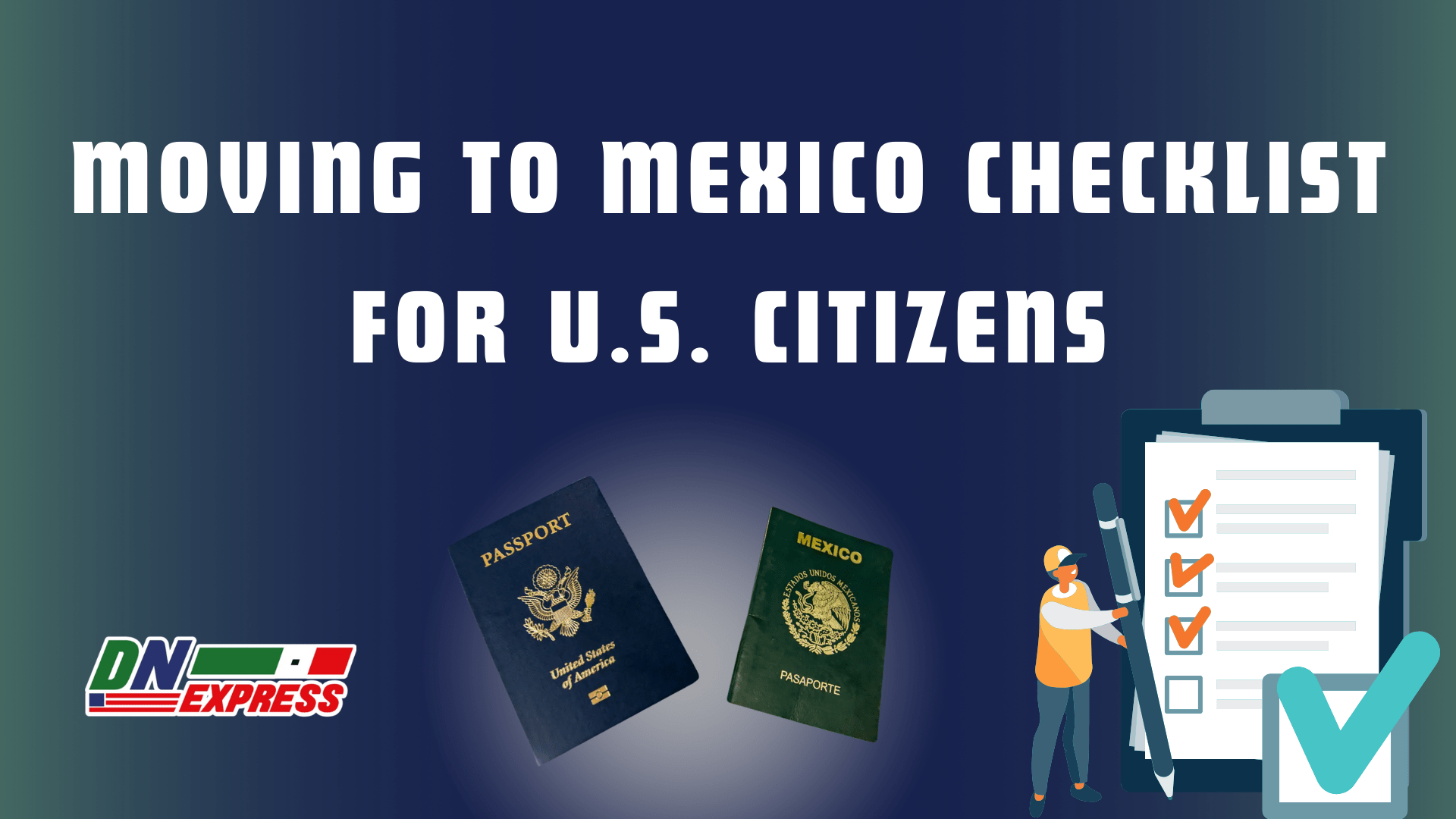
Moving to Mexico? Here's your definitive checklist: from visas and residency paths to housing, healthcare, and legal tips for long-term living. Whether you're reclaiming your Mexican nationality or starting fresh as an expat, this guide covers everything you need to move with confidence.
Relocating to Mexico varies for each person. The legal path and the documents you'll need can vary drastically depending on your background.
Some readers may already qualify for dual citizenship through a Mexican parent. Others might be moving with their children, seeking residency as a spouse, or simply exploring a new life abroad.
That's why this checklist is structured for multiple scenarios, so you don't waste time chasing the wrong steps.
As licensed binational attorneys, we've helped over 3,000 families secure legal residency, correct vital records, and reclaim their right to Mexican citizenship. If you want to skip the consulate visits, eliminate errors, and fast-track your move legally, we can help you do it right the first time.
If you're here for the full breakdown, keep reading. We've laid out every step you need to know.
Who This Checklist Is For
Not everyone moving to Mexico is starting from the same point, and that matters more than you think. Depending on your heritage, marital status, or past consulate experience, your path to legally living in Mexico could be very different.
The paperwork, the residency route, even your right to citizenship, it all changes based on your background. That's why this checklist is tailored for people like you.
U.S.-Born Adults with Mexican Parents
If you were born in the U.S. but your mother or father was born in Mexico, you may already have the right to dual citizenship through descent, even if no one ever registered it. This is one of the clearest paths to dual nationality.
Once registered, you don't need a visa or residency permit. You're legally Mexican.
That opens doors to owning property, healthcare, and even voting rights. The biggest hurdle? Getting your documents corrected and accepted without consulate delays.
Parents Registering Their U.S.-Born Children
For parents planning a move, registering your children for Mexican citizenship early is a smart and often overlooked step.
It's much easier to secure dual nationality for minors, and doing so early prevents future immigration complications. Whether your child is a newborn or teenager, this checklist helps you gather the right paperwork and avoid legal delays.
Individuals Rejected by the Consulate
Maybe you've already tried and failed to apply. We see this all the time.
Many people are wrongly denied citizenship or residency due to mismatched names, missing apostilles, or being told they need a living parent to apply. You don't.
With the right legal strategy, rejected cases can be fixed. This checklist shows what to review before trying again and how to avoid getting ghosted by the consulate.
Mexican Citizens Registering Family Members
If you're a Mexican national wanting to register your spouse, children, or parents, you're in a unique position. You can unlock legal residency or even nationality for your family, but only if your documents are in order.
From name corrections to apostilles to certified translations, this guide walks you through the family-based registration process from a legal perspective.
People Seeking a Plan B or Economic Flexibility
Not everyone is moving to Mexico because of family ties. Some want lower living costs, better healthcare, or an affordable retirement plan.
Others want a second nationality as a safety net. Whatever your reason, this checklist is for you too.
It covers the residency paths, financial thresholds, and real-world logistics of relocating without the fluff.
Legal Requirements to Move to Mexico
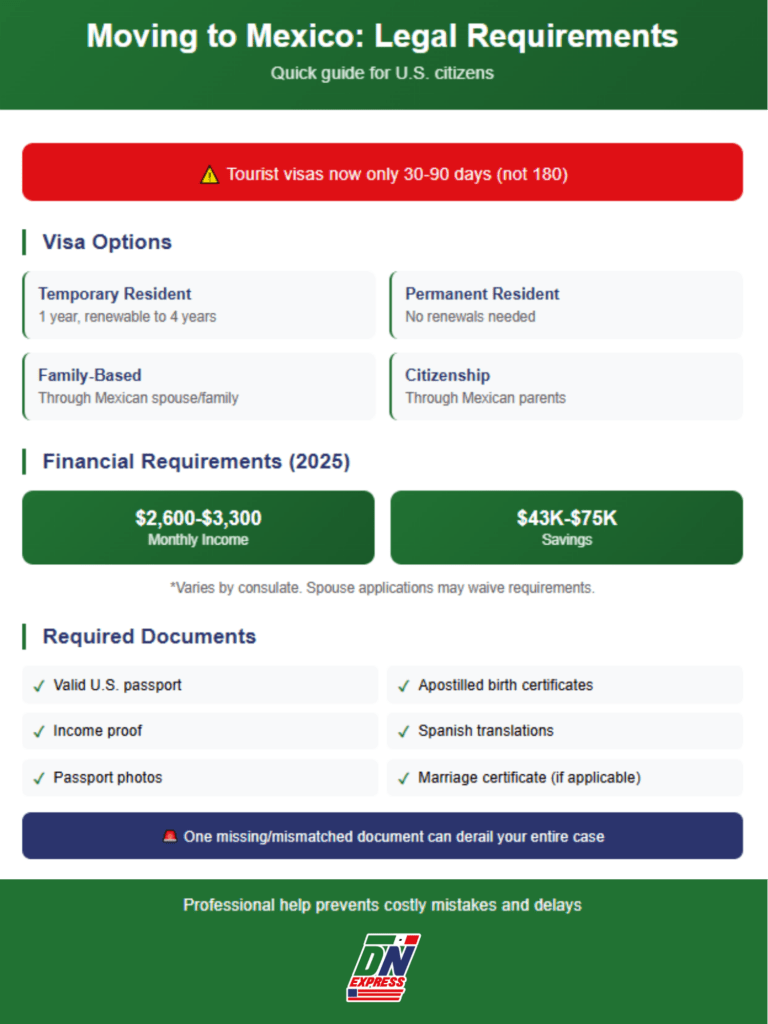
Before you pack your bags, it's vital to understand Mexico's legal entry and residency system. Many Americans assume the process is simple, but immigration laws have tightened, and what used to be a six-month tourist stay is no longer always honored.
Depending on your plans, you may need a visa, proof of income, and properly prepared documents before you go.
Do I Need a Visa to Move to Mexico?
U.S. citizens can technically stay in Mexico for up to 180 days on a tourist visa. But here's the reality: immigration officials now have discretion, and it's increasingly usual to receive only 30–90 days at entry.
That uncertainty can wreck long-term plans, especially if you're trying to open a bank account, rent an apartment, or enroll in healthcare.
If you plan to stay longer or live permanently in Mexico, you should apply for one of the following:
- Temporary Resident Visa Valid for 1 year initially, renewable up to 4 years. Ideal for remote workers, retirees, or first-time movers.
- Permanent Resident Visa No renewals required. Best for those with strong financials or close family ties in Mexico.
- Spouse or Family-Based Residency If you're married to a Mexican citizen or have qualifying relatives, your path is faster and often cheaper, with fewer financial requirements.
- Citizenship Through Parents or Ancestry If you qualify by blood, you may not need a visa at all. Mexican citizenship grants full rights and eliminates immigration stress permanently.
Financial Requirements for Residency
To apply for most visas, you'll need to prove you can support yourself. Each consulate sets its own financial standards, but general 2025 financial requirements include:
- Monthly Income: $2,600–$3,300 USD Prove consistent income for the past 6–12 months through bank statements or retirement checks.
- Savings: $43,000–$75,000 USD Show sufficient funds in your account over a 12-month period.
Note: These numbers vary by consulate, and not all accept the same forms of proof. We've seen people get rejected for relying on employer letters or screenshots instead of formal bank records. And if you're applying through a spouse, the financial rules may not apply at all.
What Documents Do I Need?
No matter which path you're on, you'll need to prepare several core documents in advance:
- Valid U.S. passport (must be current)
- Apostilled birth certificates (U.S. and Mexican, if applicable)
- Proof of income (bank statements, pension, investments)
- Certified Spanish translations for all documents
- Passport-size photos (Mexico has specific sizing rules)
Even one missing or mismatched document, like a name misspelled on a birth certificate, can derail your entire case.
We specialize in correcting these issues before they turn into problems. Whether you're missing a Mexican parent's birth certificate or your documents don't align, we can recover missing birth certificates or fix them legally so your application gets approved the first time.
The Practical Relocation Checklist
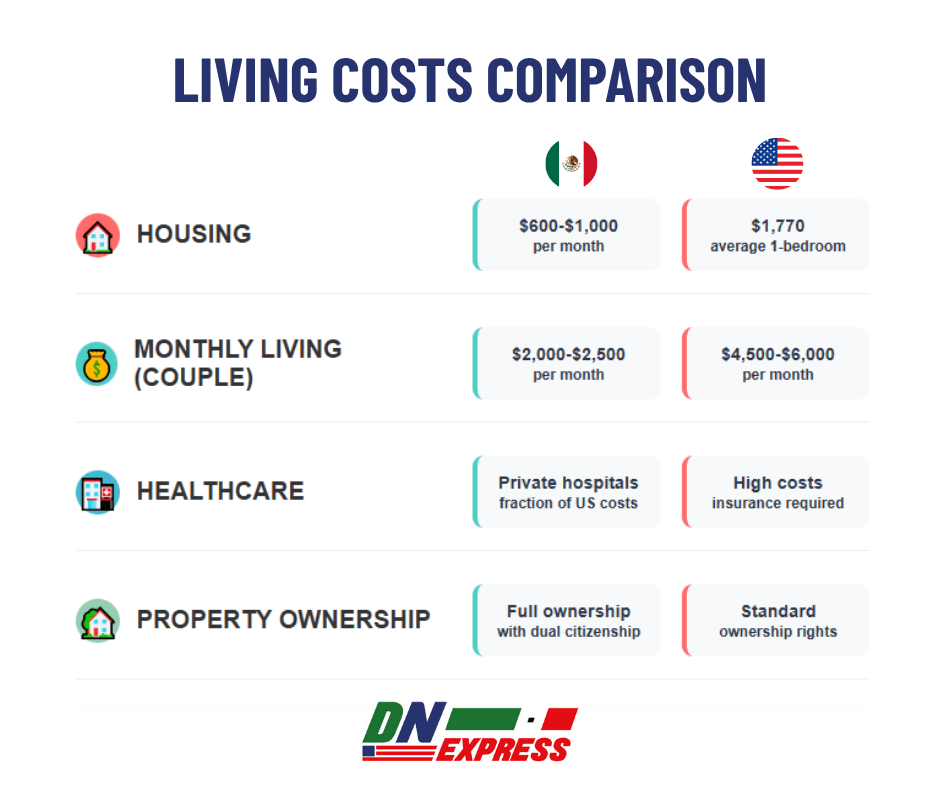
The paperwork is one piece of the puzzle. Moving to Mexico also involves real-world decisions about where to live, how to access basic services, and what steps to take during your first few weeks.
Here's how to make sure your relocation is smooth, legal, and fully prepared before and after arrival.
Before You Move
- Choose 2–3 Cities to Explore in Person: Not all cities in Mexico are the same, and choosing where to live should go beyond travel blogs. Visit in person if possible.
- Think about safety, internet infrastructure, cost of living, healthcare access, and whether you prefer urban life or small-town charm. Areas like Mérida, Querétaro, or San Miguel de Allende offer vastly different lifestyles compared to places like Tijuana or Mexico City.
- Secure Housing: Most Americans start with a short-term furnished rental for 1–3 months. Long-term leases can be tricky without residency or a local co-signer, so don't rush.
- Research Consulate Appointment Availability: If you're applying for residency, you'll need to start the process at a Mexican consulate outside of Mexico. Appointment wait times vary by location, some are booked months in advance, while others have last-minute openings.
- Hire Help If Correcting Documents or Applying for Dual Citizenship: If you're pursuing dual nationality, family-based residency, or have past rejections, professional help can save you months of delays. We offer complete legal services, including apostille requirements, name corrections, and recovery of missing birth certificates, so you're not stuck flying back and forth trying to fix paperwork.
When You Arrive
- Register Your Address at INM (Immigration): Once in Mexico on a residency visa, you'll need to complete your process at an INM office (Instituto Nacional de Migración) within 30 days. This includes biometric data, local address confirmation, and receiving your residency card.
- Open a Mexican Bank Account: Some banks require a residency card to open an account, while others may accept a tourist visa with additional documentation. Bring multiple forms of ID, proof of address, and be prepared to visit multiple branches, policies are inconsistent across cities.
- Sign Up for Internet, Utilities: Don't assume fiber internet is available everywhere. Call ahead or ask landlords which providers serve the property.
- Choose Public or Private Healthcare Coverage: As a resident, you can apply for Mexico's public healthcare system (IMSS), but many expats opt for private insurance due to faster service and broader coverage. Some policies require you to already hold legal residency, so time your application accordingly.
Special Considerations Most Blogs Miss
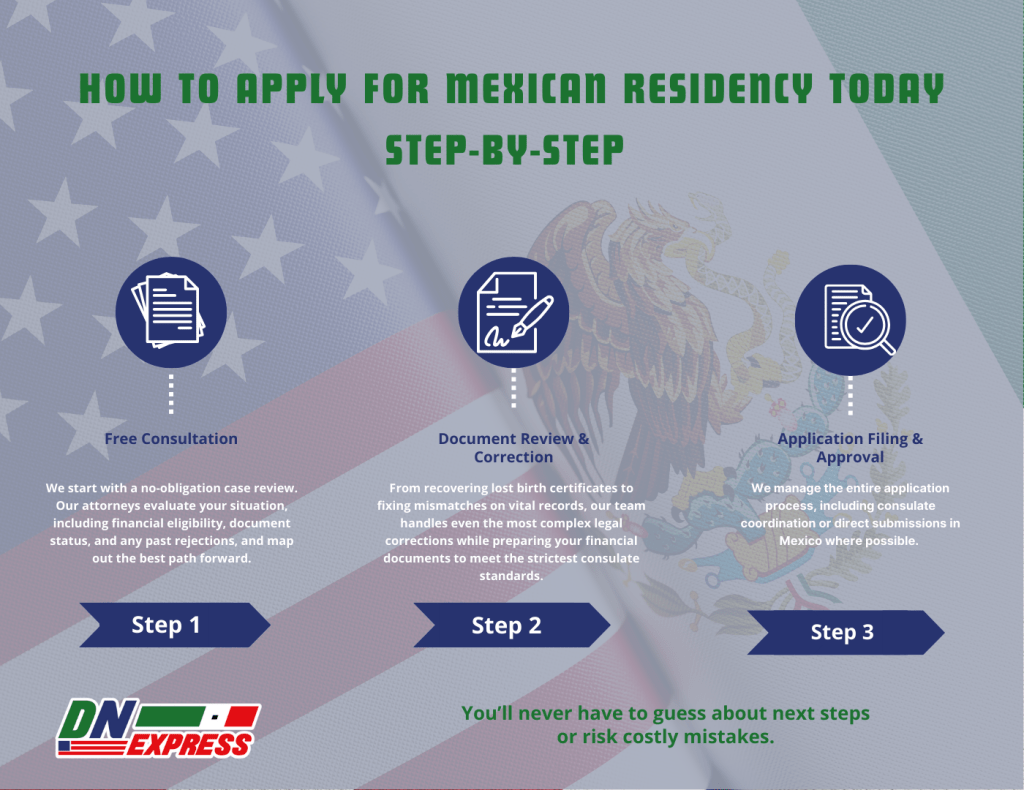
Plenty of online guides can walk you through surface-level steps: get a visa, find a place, move your stuff.
But what they miss are the legal landmines and small missteps that can quietly derail your move.
These are the issues we see every week with Doble Nacionalidad Express, and they're exactly why legal help matters.
Things They Don't Tell You
- Residency Appointment Wait Times Can Wreck Your Timeline: While some Mexican consulates offer appointments in a week, others book 3+ months in advance. If you don't plan around this, you might find yourself with a flight booked but no visa appointment, and no way to move legally.
- Pet Travel Is Simpler Than You Think: Contrary to what many believe, you don't need a vet health certificate from the U.S. or Canada to bring pets into Mexico. But you do need to comply with SENASICA pet travel guidelines, so check what's required before your flight.
- Name and Document Mismatches Are a Legal Nightmare: If your documents show different spellings, missing accents, or inconsistent middle names, your application can be denied, even if you “know” it's the same person. We've seen siblings denied dual citizenship due to a single letter difference on a birth certificate.
- Even Small Errors Are Treated Seriously in Mexico: Accent marks, middle names, and document formatting matter in Mexican legal systems. These are not technicalities. They're deal-breakers. If your documents don't match exactly, don't submit your application yet. Fix it first with correcting birth certificate errors guidance.
- Permanent Residents Must Keep Immigration Updated: Unlike tourist stays, legal residency comes with obligations. You're required to notify INM of any address changes and keep your residency status current.
Failure to do so could cause issues renewing your residency, or worse, lead to cancellation.
Why You Should Work with Doble Nacionalidad Express

Moving to Mexico goes beyond filling out forms. It's about navigating a legal system that can be inconsistent, even when you follow the rules.
Most families don't get rejected because they “did it wrong.” They get rejected because they didn't have access to proper legal help.
That's exactly why I started Doble Nacionalidad Express.
I'm a binational legal professional who's seen too many families turned away for preventable reasons: missing records, mismatched names, misinformed by the consulate. We built this service to give U.S. citizens of Mexican descent a genuine path to reclaim their identity and legal rights in Mexico, without confusion or consulate runarounds.
Don't Navigate This Alone, Especially If:
- You've been rejected by the consulate before
- You're not sure which documents are valid or acceptable
- You don't have your Mexican parent's birth certificate or CURP
- You can't take time off work to make multiple consulate trips
- You want legal certainty, not guesswork or social media advice
You don't have to “figure it out” on your own. Our team knows what documents are needed, which consulates to avoid, and how to fix cases that have been denied.
What Doble Nacionalidad Express Offers:
- No consulate visits required in most cases, we handle it for you
- Licensed Mexican attorneys review every application
- Record search + document correction if anything's missing or inconsistent
- Fast, bilingual customer service by phone, email, and WhatsApp
- Remote service, we work with clients in all 50 U.S. states and abroad
- Affordable pricing, with flexible payment plans available
- Over 3,000 successful approvals and counting
We don't believe legal identity should be a privilege for those who “know someone” or live near a big city. Whether you're applying from Los Angeles, Laredo, or anywhere in between, we're here to make it simple, secure, and accessible.
Our affordable pricing includes flexible payment plans to fit your budget.
Final Checklist Recap
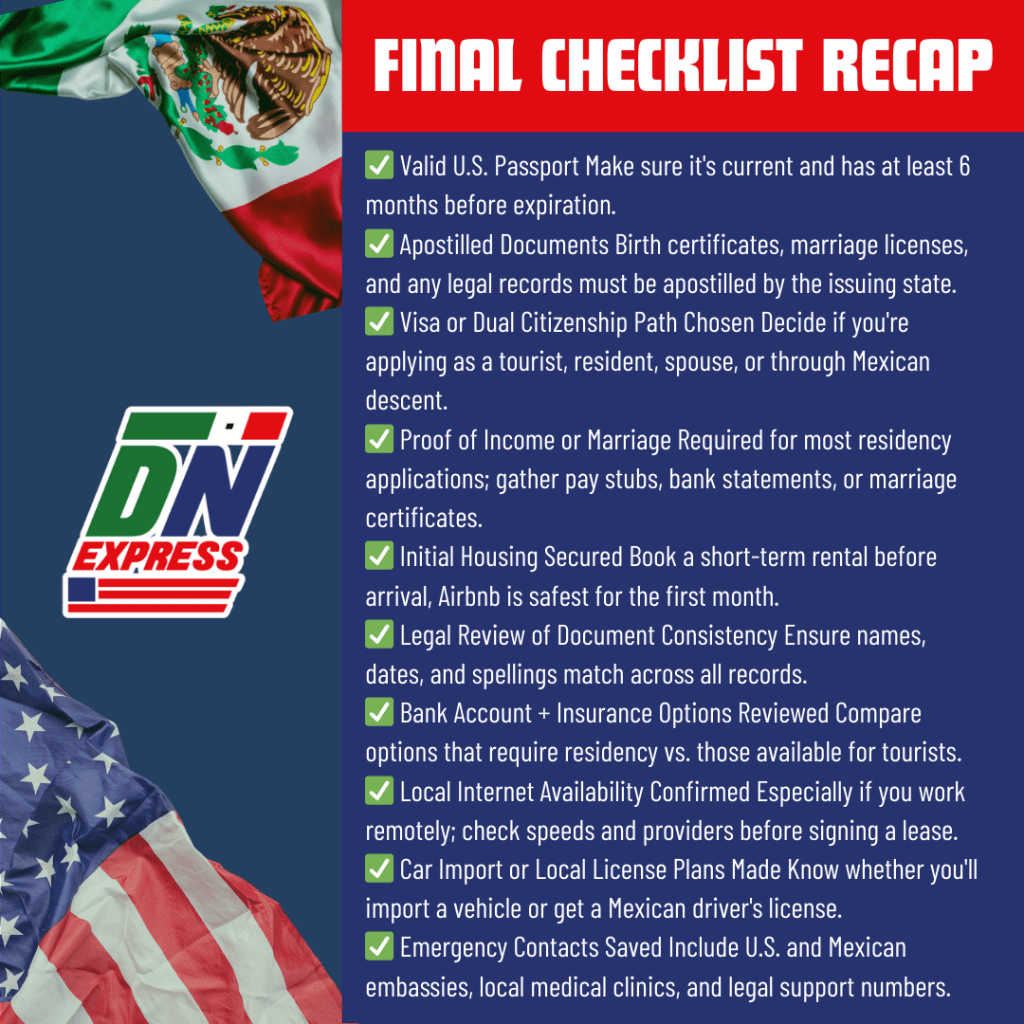
Ready to move forward? Here's a condensed, printable version of your moving-to-Mexico checklist.
Whether you're applying for dual citizenship, residency, or planning your first few months abroad, these are the fundamentals you shouldn't skip:
- Valid U.S. Passport: Make sure it's current and has at least 6 months before expiration.
- Apostilled Documents: Birth certificates, marriage licenses, and any legal records must be apostilled by the issuing state.
- Visa or Dual Citizenship Path Chosen: Decide if you're applying as a tourist, resident, spouse, or through Mexican descent.
- Proof of Income or Marriage: Required for most residency applications; gather pay stubs, bank statements, or marriage certificates.
- Initial Housing Secured: Book a short-term rental before arrival, Airbnb is safest for the first month.
- Legal Review of Document Consistency: Ensure names, dates, and spellings match across all records.
- Bank Account + Insurance Options Reviewed: Compare options that require residency vs. those available for tourists.
- Local Internet Availability Confirmed: Especially if you work remotely; check speeds and providers before signing a lease.
- Car Import or Local License Plans Made: Know whether you'll import a vehicle or get a Mexican driver's license.
- Emergency Contacts Saved: Include U.S. and Mexican embassies, local medical clinics, and legal support numbers.
Ready to Start?
You don't have to navigate this move alone. Whether you're applying for dual citizenship, starting over in a new country, or helping your kids reclaim their cultural identity, DNExpress here to help you do it right.
We'll review your case for free, identify any missing documents, and walk you through the process from start to finish. No consulate visits, no guesswork, and no wasted time.
📞 Call, text, or Message Us on WhatsApp today to begin your journey. Your future in Mexico starts with one clear step, and we're ready when you are.
Contact us for a consulta gratis to get started.
Frequently Asked Questions About Moving to Mexico
Most of our clients come to us with the same handful of questions: legal, financial, and practical. Here are the answers you need before making your move.
Can a U.S. Citizen Move to Mexico Permanently?
Yes. You can live in Mexico full-time through either permanent residency or Mexican citizenship.
If you qualify for citizenship through a Mexican parent, you don't need a visa or residency card. You're already a citizen by right under Mexico's official dual nationality policy.
For others, the path is through residency, which starts with a temporary visa and can transition to permanent status.
How Hard Is It for an American to Move to Mexico?
It depends entirely on your legal background. If you're eligible for dual citizenship, the process is straightforward with the right documents.
If not, you'll need to meet financial requirements, gather certified paperwork, and deal with consulate scheduling. The hardest part? Getting consistent answers from Mexican authorities, especially when documents are inconsistent or missing.
That's where having legal guidance, like from Doble Nacionalidad Express, can change everything. Understanding the true dual citizenship costs upfront helps you budget properly.
Can I Buy Property in Mexico?
Yes, even as a foreigner. You can legally own property in most parts of Mexico.
If you're purchasing near the beach or border, you'll need to set up a fideicomiso (bank trust), which grants you all the rights of ownership through a Mexican bank. Properties inland can be purchased directly in your name.
Pro tip: Owning property in Mexico does not give you legal residency. These are two separate legal processes.
How Long Can I Stay as a Tourist?
The law says up to 180 days, but that's not a guarantee. In reality, immigration officers at airports and land borders are now issuing shorter stays, sometimes 30 or 90 days, without explanation.
This shift makes relying on the “perpetual tourist” lifestyle risky. If you're planning to stay long-term, apply for residency.
How Much Does It Cost to Live in Mexico?
- Basic lifestyle: $1,000–$1,700/month
- Comfortable expat life: $2,500–$3,000/month
These figures depend heavily on location, housing type, and whether you eat out or cook at home. Cities like Oaxaca, Guadalajara, or Puebla offer great value, while beachfront towns and major metros like CDMX are more expensive.
Healthcare, rent, and food are generally far more affordable than in the U.S. Remember that dual citizens have U.S. tax obligations for dual citizens regardless of where they live.
Why Are So Many Americans Moving to Mexico?
There's no single reason, but here are the ones we hear most often:
- Cost of living is lower across the board
- Certain regions feel safer or more peaceful
- Cultural roots and family connections
- Easier lifestyle for retirees and remote workers
- Frustration with U.S. politics, inflation, or healthcare costs
Whether you're seeking stability, opportunity, or a return to your roots, Mexico offers a compelling option for those ready to make a change.
Is it safe to drive through Mexico?
Yes, in many areas. But you need to plan carefully.
Stick to toll roads (cuotas), drive during daylight hours, and map out gas stops in advance. Avoid high-risk regions and always check local guidance.
Thousands of Americans drive through Mexico safely every year, but preparation is key.
What happens if I don't cancel my car import permit?
If you enter Mexico with a U.S. vehicle on a temporary permit and don't cancel it when you leave, you may face fines or be blocked from bringing in another car in the future. It's a widespread mistake with long-term consequences.
Always cancel the TIP at the same border you entered.
I work remotely. Can I get fast internet in Mexico?
In most major cities and many mid-size towns, yes. Areas like Mexico City, Guadalajara, and Mérida have fiber-optic providers like Telmex and TotalPlay.
That said, check before you sign a lease. Rural areas or older buildings may lack stable service. Ask your landlord for speed test results or provider details in advance.
These are not technicalities. They're the things that affect your quality of life in Mexico.



